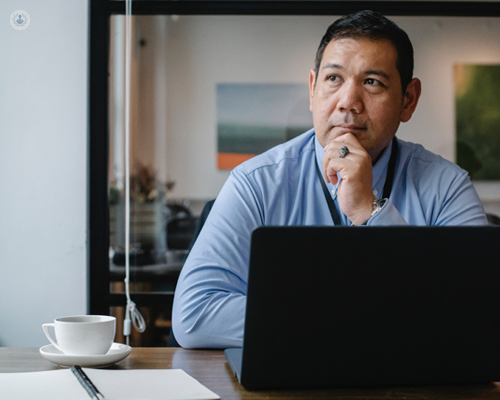Bowel cancer: Detection, treatment and prevention
Written in association with:Leading consultant gastroenterologist Dr George Goodchild provides a detailed look at bowel cancer detection, treatment and prevention in this informative article.

What is bowel cancer and how does it affect the bowel?
Bowel cancer, also known as colorectal cancer, is characterised by the abnormal growth of tissue within the large bowel (colon) or rectum. This malignancy often begins as benign polyps, which are small growths on the inner lining of the colon or rectum. Over time, these polyps can undergo changes that lead to cancer. The progression from a benign polyp to a malignant tumour can disrupt normal bowel function, leading to symptoms and potential complications.
What are the early signs?
Early detection of bowel cancer is critical for successful treatment. Fortunately, all bowel cancers start as benign polyps, which can take many years to turn cancerous. This extended window provides a significant opportunity for preventive measures. Recognising the early signs of bowel cancer is essential for timely intervention. Symptoms to watch for include:
- A change in bowel habits, such as diarrhoea or constipation, that persists for more than a few weeks
- Unexplained weight loss
- Rectal bleeding or blood in the stool
- Persistent abdominal pain or discomfort
Early detection and removal of polyps can prevent them from becoming cancerous, reducing the risk of bowel cancer.
How long can bowel cancer be undetected?
Polyps can remain in the colon for many years without causing symptoms. This asymptomatic period can span several years, during which the polyps may slowly grow and potentially turn cancerous. This underscores the importance of regular screening, especially for individuals over the age of 50 or those with a family history of bowel cancer. Regular screening can identify polyps before they progress to cancer, allowing for early and effective intervention.
Can bowel cancer be picked up via endoscopy? What's involved in this process?
Colonoscopy is a highly effective method for detecting and removing polyps before they become cancerous. This procedure involves inserting a long, flexible tube equipped with a camera (colonoscope) into the rectum to examine the entire colon. During a colonoscopy, the physician can identify and remove polyps, thus preventing the development of bowel cancer.
The process of colonoscopy includes the following steps:
- Preparation: Patients must follow a special diet and take a laxative the day before the procedure to clear the bowel.
- Sedation: Most patients receive a sedative to help them relax and minimise discomfort during the procedure.
- Examination: The colonoscope is carefully inserted into the rectum and guided through the colon. The camera transmits images to a monitor, allowing the physician to inspect the bowel lining for polyps or other abnormalities.
- Polyp removal: If polyps are found, they can be removed immediately using tools passed through the colonoscope.
- Recovery: After the procedure, patients are monitored until the effects of the sedative wear off. They can usually go home the same day.
Colonoscopy is considered the gold standard for colorectal cancer screening due to its ability to detect and remove polyps in a single procedure. Once polyps are cleared, the patient's risk of developing bowel cancer in the near future is significantly reduced.
Can bowel cancer be cured?
Early detection of bowel cancer significantly improves the chances of a cure. In the UK, most bowel cancers are detected at an early stage, allowing for effective treatment and a high likelihood of curing the disease. However, early detection relies on recognising and responding to symptoms promptly. If any of the following symptoms develop, seeking a specialist opinion is crucial:
- Persistent changes in bowel habits
- Unexplained weight loss
- Rectal bleeding or blood in the stool
- Ongoing abdominal pain or discomfort
When detected early, bowel cancer can often be treated successfully with surgery, radiation therapy and chemotherapy, depending on the stage and location of the tumour. Regular screening and awareness of symptoms are key to catching bowel cancer in its early, more treatable stages.
If you’re concerned about bowel cancer, arrange a consultation with Dr Goodchild via his Top Doctors profile.


